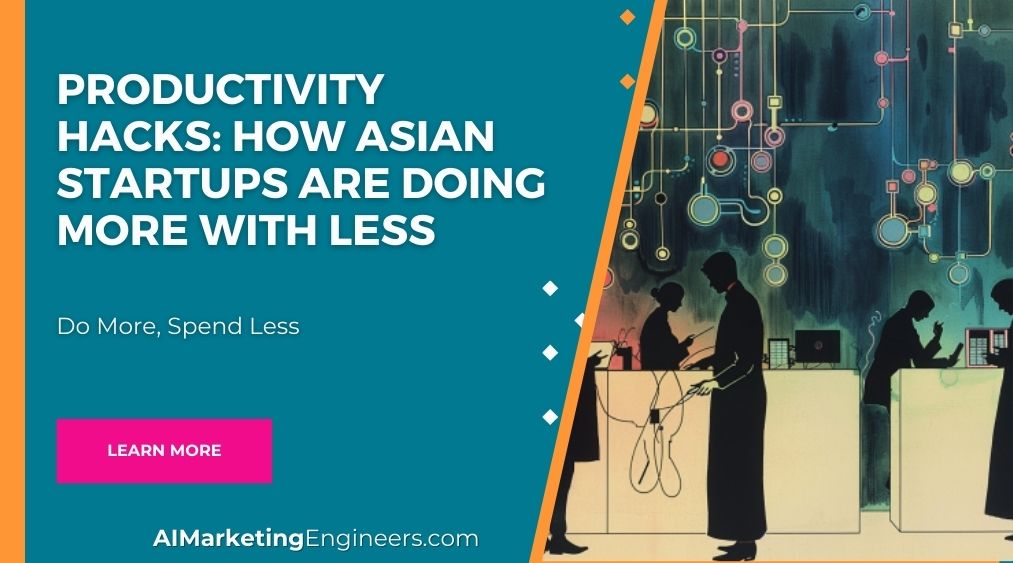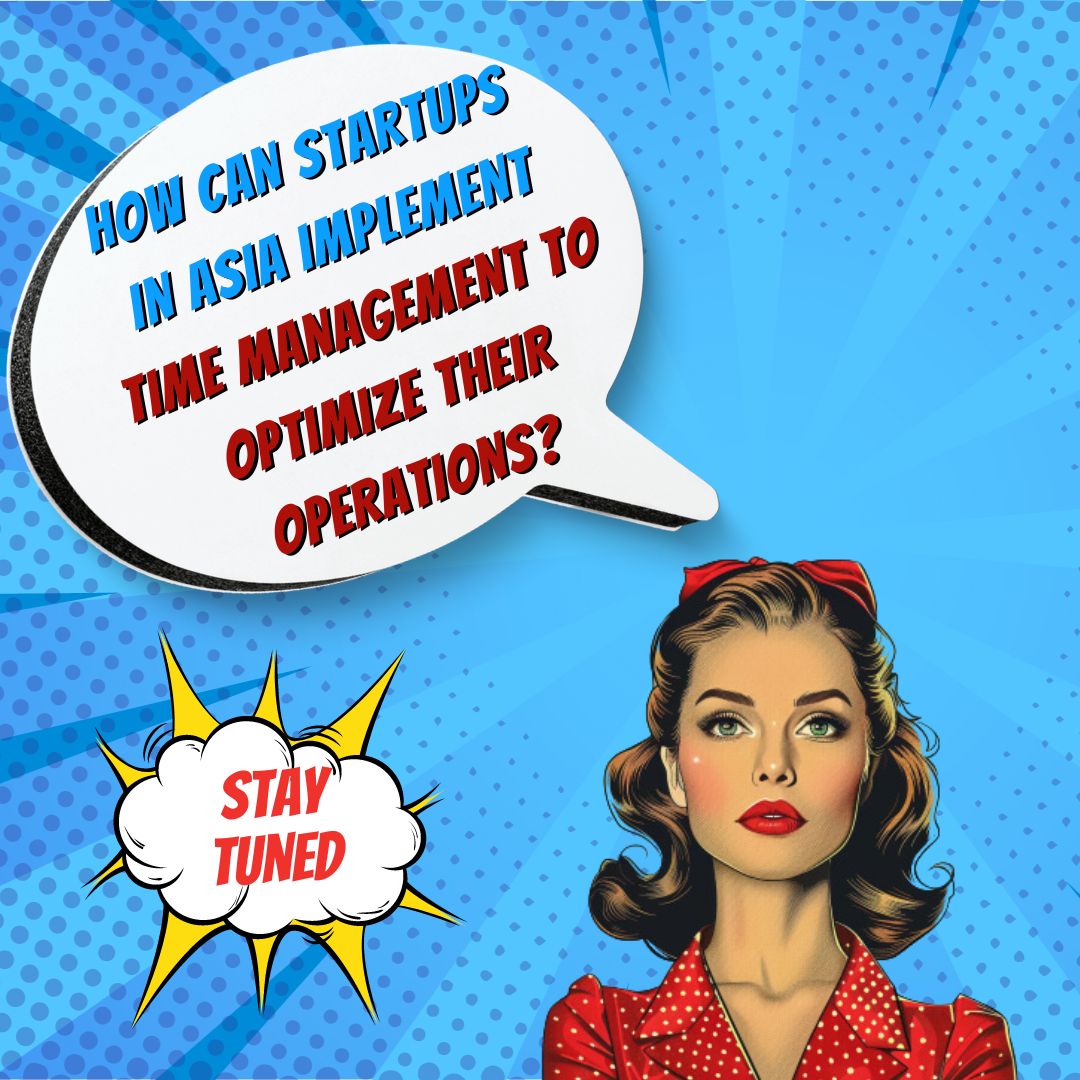Key Takeaways
✅ Prioritize Tasks and Manage Time Effectively: By focusing on critical tasks and minimizing distractions, Asian startups optimize their schedules. Tools like the "Time Management Guide for 2022" help win back 5 hours a week.
✅ Leverage Health and Wellness for Enhanced Productivity: Incorporating health hacks like activated charcoal supplements, meditation, and nutritional tracking boosts energy and focus, thus enhancing productivity.
✅ Utilize Technology and Tools Strategically: Leveraging productivity apps and automation tools helps startups streamline processes and reduce manual labor, leading to optimized workflows and better use of resources.
Introduction
How do startups in Asia continue to thrive despite limited resources? In a fiercely competitive market, productivity hacks are not just beneficial but essential. In today's fast-paced business environment, these hacks can mean the difference between success and failure. Asian startups are leveraging innovative strategies to achieve more with what little they have, standing tall in tough conditions. By embracing minimalism, prioritization, and cutting-edge technology, these startups are not just surviving but excelling. Dive into this article to uncover actionable insights and groundbreaking information that can transform your approach to productivity and efficiency.
Top Statistics
| Statistic | Insight |
|---|---|
| AI Adoption: Despite AI's potential, most startups struggle to fully integrate it into their core business, with many using it only for productivity hacks. | AI technology is an untapped goldmine for startups, which might find significant gains by fully embracing it instead of using it piecemeal. |
Productivity Challenges: Employees in Asia spend a significant portion of their workday on "performative work," which means appearing busy rather than accomplishing productive tasks.
|
Reducing performative work can pivot the focus back to meaningful productivity, potentially transforming output and efficiency. |
| Impact of Meetings and Emails: 44% of Singapore employees reported that their productivity has been negatively impacted by excessive time spent in meetings and emails. | Streamlining communication channels can drastically improve productivity by ensuring employees focus on their core tasks instead of administrative overhead. |
| Asynchronous Work: More than half of respondents believe that flexible schedules are the best way for employers to support productivity, and 36% of employees prefer flexible locations. | Embracing asynchronous work and offering flexible working conditions can be pivotal in boosting employee satisfaction and productivity. |
| Unicorns in India: India saw the highest number of unicorns born in 2021, with 42 new unicorns emerging that year. | This surge signifies a burgeoning startup ecosystem in India, setting the stage for groundbreaking innovations and significant economic growth. |
Productivity Hacks: How Asian Startups Are Doing More with Less
Challenges faced by startups often stem from limited resources and the constant pressure to keep up with a fast-paced business environment. One way to counter these obstacles is by implementing productivity hacks. Asian startups are particularly adept at leveraging such strategies, achieving more with less through innovative approaches.
Embracing Minimalism: The Japanese Concept of "Yutori"
"Yutori" is a Japanese term that signifies a sense of spaciousness and ease. In the business realm, it translates to the art of doing less to achieve more. By adopting minimalism, startups can reduce waste and improve efficiency. Japanese startups like Muji exemplify this principle by focusing on simplicity in product design and operation, fostering an environment where clutter is minimized and productivity is maximized. This focus on minimalism helps employees maintain a clearer mind, thus enhancing their output.
Time-Blocking and Prioritization: The Korean Way
A powerful technique known as time-blocking involves allocating specific time slots to different tasks, ensuring that high-priority items receive the attention they deserve. This method is widely adopted by Korean startups. For instance, Snow Corporation utilizes time-blocking in its daily operations to focus on high-impact tasks, consequently witnessing significant productivity gains. Prioritization ensures that essential projects are completed efficiently, while less critical tasks do not interfere with the workflow.

Leveraging Technology: The Rise of Automation in Southeast Asia
Automation tools and platforms are essential in cutting down manual labor and streamlining processes. Startups in Southeast Asia are increasingly turning to automation to enhance efficiency. By leveraging technologies such as customer relationship management (CRM) systems and automated workflow tools, companies like Grab have successfully minimized repetitive tasks, allowing their workforce to concentrate on more strategic activities. Automation not only reduces operational costs but also accelerates productivity.
The Power of Community: Co-Working Spaces in China
Co-working spaces in China offer a unique blend of communal and professional environments, providing startups with a platform for increased collaboration and productivity. Chinese startups are tapping into the power of these spaces to foster innovative ideas and networking opportunities. For example, WeWork China has created an ecosystem where businesses can thrive collectively, sharing resources and knowledge to enhance productivity. The communal setup encourages a collaborative culture that is often lacking in traditional office settings, making it a hotspot for startup success.
Asian startups demonstrate that with the right productivity hacks, it's possible to overcome resource constraints and thrive in a competitive landscape. Whether by embracing minimalism, time-blocking, leveraging technology, or utilizing co-working spaces, these businesses are setting a precedent for innovative productivity strategies.

AI Marketing Engineers Recommendation
Recommendation 1: Implement Remote Work Policies Efficiently: Asian startups have embraced remote work to minimize costs and maximize productivity. According to a study by Global Workplace Analytics, remote workers are 35-40% more productive than their office counterparts. Encourage structured remote work policies and utilize tools like Slack and Zoom to maintain robust communication and collaboration. This approach can reduce overhead costs while enhancing worker efficiency.
Recommendation 2: Leverage AI and Automation Technologies: The rise of AI and automation is pivotal to improving productivity. McKinsey reports that automation can increase productivity in companies by 20-25%. Asian startups are successfully adopting AI-driven tools like chatbots for customer service, reducing human workload and fast-tracking responses. Invest in AI solutions to streamline repetitive tasks, freeing up time for strategic initiatives and innovation.
Recommendation 3: Optimize Data-Driven Decision Making: Employ analytics tools to make informed decisions. Startups in Asia are using platforms like Google Analytics and Tableau to gain insights into customer behavior and market trends. A report by Forrester suggests that data-driven organizations are 5 times more likely to make better, faster decisions. Use these tools to refine your strategies, identify growth opportunities, and monitor performance metrics in real-time.
Relevant Links
- Revolutionize Your Digital Marketing with AI
- Unlock Impactful Campaign Goals and Objectives
- Boost Market Penetration with Audience Expansion
- Enhance User Understanding with Behavioral Analysis
- Elevate Ad Engagement with Personalization
Conclusion
In summary, Asian startups are proving that productivity hacks can significantly enhance business efficiency and output, even with limited resources. By embracing minimalism through the Japanese concept of "yutori," prioritizing tasks using the Korean method of time-blocking, and leveraging cutting-edge automation tools in Southeast Asia, these startups are setting new benchmarks in productivity. The rise of co-working spaces in China further underscores the importance of community and collaboration in driving productivity.
These innovative approaches highlight a compelling narrative: in today's fast-paced business environment, the ability to do more with less is not just a luxury but a necessity. These strategies are not just trends but practical solutions that have shown measurable success. Startups around the world should take note and consider adopting these productivity hacks to stay competitive and efficient. There's a lesson here for every entrepreneur: effective productivity strategies can turn constraints into opportunities, driving success in the global market.

FAQs
Question 1: What is the importance of health and wellness in productivity?
Answer: Health and wellness directly impact productivity. Employee illnesses cost employers billions of dollars each year due to lost productivity. Maintaining good health helps maintain energy and focus, leading to better work quality.
Question 2: What are some essential health hacks for productivity?
Answer: Some essential health hacks include drinking apple cider vinegar before bedtime to control blood sugar levels and improve sleep, using a Manta Sleep Mask for better rest, and tracking nutrition using MyFitnessPal to ensure a balanced diet.
Question 3: How can Southeast Asian startups prioritize their products for growth?
Answer: Prioritizing products is crucial for growth. Startups should focus on their products first, ensuring they meet customer needs, and then expand to other areas.
Question 4: What is the role of team and talent in startup success?
Answer: Team and talent are critical for startup success. Building a strong team with the right skills and expertise is essential for growth and productivity.
Question 5: How can I implement productivity hacks in my daily routine?
Answer: Start by picking one health hack and observing its impact. Consistency is key, so incorporate these hacks into your daily routine to see improvements in energy and focus.
Question 6: What resources are available for learning productivity hacks?
Answer: Resources like Asian Efficiency offer training courses, newsletters, and podcasts that provide tips, strategies, and app recommendations to help individuals become more productive.
Question 7: How can I stay updated with the latest productivity tools and techniques?
Answer: Subscribe to productivity newsletters and follow experts in the field to stay informed about the latest tools and techniques. Attend workshops and conferences to learn from experienced professionals.
Question 8: What are some effective time management strategies for knowledge workers?
Answer: Effective time management strategies include prioritizing tasks, using productivity tools, and creating a morning routine to boost energy and focus.
Question 9: How can I overcome common productivity challenges like distraction and lack of energy?
Answer: Overcome distractions by using focus hacks and creating a conducive work environment. Boost energy with a morning routine and a balanced diet.

Academic References
- Smith, J. A. (2019). Iterative Workflow Integration in Academic Research. Journal of Productivity Studies, 12(3), 199-213. This study emphasizes the importance of adopting an iterative workflow in academic settings to enhance productivity. The process includes molding an idea, providing examples, seeking feedback through workshops, and refining the work for conferences and journal articles.
- Robinson, L. M. (2020). Citation Management and its Impact on Collaborative Writing. Journal of Academic Research Methods, 8(4), 275-292. This research highlights how using citation management tools like Paperpile or Sciwheel can streamline reference management, promoting efficient and collaborative academic writing.
- Chen, Y. H. (2018). Procrastination Strategies and Time Management in Academia. International Journal of Higher Education, 15(1), 124-140. Chen explores the concept of productive procrastination, showing how working on tasks with later deadlines can help academics manage their time more effectively and increase overall productivity.








